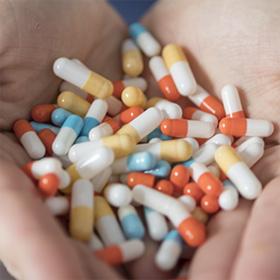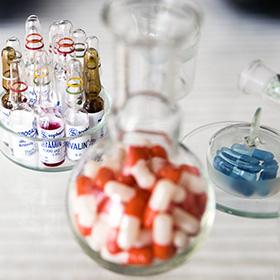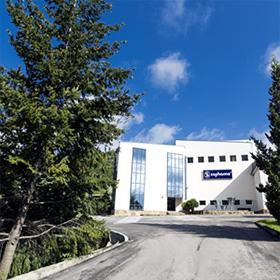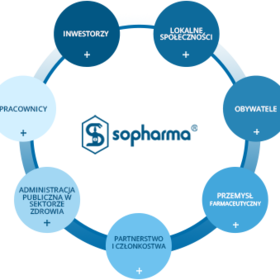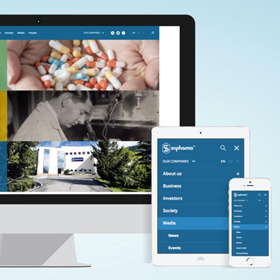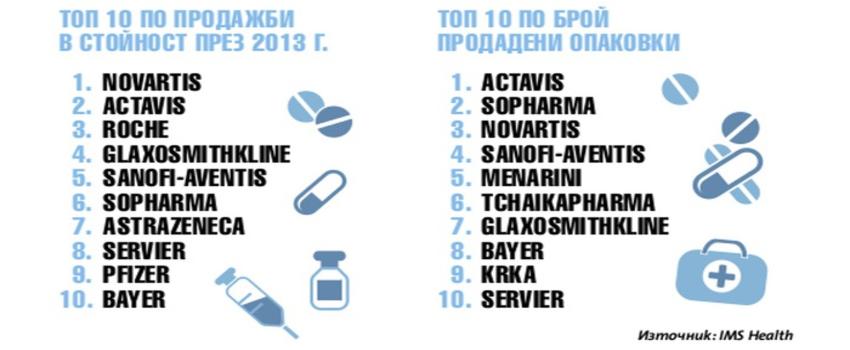"Last year Sopharma, the only company with Bulgarian majority owners in the Top 10, also continued to perform well and marked sales growth of its drugs in value."
Source: IMS Health
TOP 10 - No. 6 - Ognyan Donev - Chairman of Sopharma Board of Directors
We are satisfied with the results we achieved last year on the Bulgarian market. We managed to maintain our positions and defended them. We are one of the two generic pharmaceutical companies in the Top 10 on the Bulgarian market and I would like to comment separately the two main segments of the drug market: OTC (over-the-counter) drugs and prescription drugs due to the different ways these are purchased by consumers.
In OTC drug segment Sopharma continues to be a leading company with 10,6 % growth according to IMS data. Once again the Analgin is the best-selling medication in number of packs on the Bulgarian market.
In the prescription drug segment price downturn for all generic companies has been seen in uncontrolled volume for almost half a year now. Thus lots of generic manufacturers are forced to withdraw their products from the market because it is often turns that they have to sell them below cost. For the time being Sopharma refrains from undertaking such extreme measures since we are committed to be a national responsible domestic producer. Of course, we feel responsible before the country as well as before our employees and their families, shareholders and all stakeholders and, therefore, we analyze carefully the current situation because we cannot afford to reduce the medication prices to infinity. The enhanced referral, together with the partial reimbursement, results in price distortions in the mass medication groups because it affects the portion of the prices paid by the National Health Insurance Fund (NHIF) for the mass medication groups in the low price category, while the portion paid by patients remains unchanged. This year we launched eight new products (six new molecules and two new medication formulations) with a total of fourteen concentrations. Our market participation remains traditionally strong in cardio-vascular system drug group for example, but as a mass generic manufacturer we strive to be present in most drug groups as well as to do it at a cost acceptable for both the society and the patients. Let's note that the average price of a drug pack produced in Bulgaria varies about BGN 3,00. This is the indicator of importance for us - we want to be present in most mass medication groups for chronic diseases in which the generic drugs (including ours) offer the gold treatment standard at a reasonably acceptable price for the country.
Of course the pharmacy, as it is well known and quite natural, is the most regulated industry branch. Therefore, it is very important that the changes in the institutional environment do not destroy the stability since the businesses need to have some predictability in planning such items as business cycles, investments and market performance. Of course, our company, like all other companies in the business sector, had to face the structure changes in the Price and Reimbursement National Center (PRNC) because the processes of structuring such an institution, starting regular operation, recruiting a team with necessary potential, etc. involved naturally quite a long period of 'frozen' procedures since the old structure operation was discontinued, while the new structure was still not able to operate. The approval of a number of prices, mainly of generic medications, got delayed. The law for the PRNC was passed in April, while the structure really - let’s emphasize it - started working somewhere in late August not for staff reasons, but for reasons of purely organizational and technological character. Although and fortunately the PRNC managed to catch up in some way, now there are some new ideas for restructuring. The situation in the Bulgarian Drug Agency (BDA) is pretty much the same - the change or the expectation of a change results also in 'lack of comfort' for the businesses - e.g. a number of documents under the authorization scheme must be signed by the director of the institution only; of course such procedures are going to be delayed in case the respective person is unavailable for some reason to sign the papers. Let’s summarize - our industry interferes in no way with the management of one or another institution our business operation depends on, but when the Government undertakes institution restructuring, personnel changes, etc., the major priority should be to endure continuity of operation processes and smooth transition period for the businesses. It is unacceptable that the Government undertakes such restructuring and does not comply with the statutory deadlines set for different permissions. Such behavior of Government institutions contradicts the interest of the patients and the NHIF since many significantly cheaper medications enter the market with considerable delay. As I already commented, the average price of a drug pack produced in Bulgaria is approximately BGN 3,00 and therefore the price pressure has already reached a critically low point. Although the price portion covered by the NHIF is decreased by some percentage due to discounts, the Bulgarian patients continue co-paying the highest prices in the European Union (EU). In the presence of powerful generic manufacturers on Bulgarian market this is the result of the lack of a rational pro-generic drug policy. Undoubtedly, the parallel trade shows that the prices in Bulgaria are favorable for such type of business model. At the same time, the attempt to regulate this phenomenon, as we have witnessed, is unlikely to restrict it. What is needed is a purposeful pro-generic drug policy, opportunities for real negotiating instead of partial discounts on behalf of the NHIF for partly paid medications (and these are the cheapest drugs) as well as undertaking mutual obligations for volumes against affordable prices. The issue is regulated similarly in Germany, France, etc. - the physicians receive incentives against the obligation to prescribe generic drugs. The situation is our country is unbalanced - if you go through drug expenditures of the NHIF, you will certainly notice that the growth is always due to expensive medications. The generic medications are much spoken about and said to be the tool capable to save the system, but we do not see real changes. Medication market measures announced early this year sound good as general intentions, but we cannot comment them as an achievement since we are looking for seeing specific results from them. At least at first reading the issue is unclear. And maybe now is the right time to make association with the proposal for new tariff for the fees the industry pays to the BDA. On the one hand, we have a total pressure on the prices, and on the other hand, there is still an unclear intention to increase the fees (how? how much? how many times?). It should be clear that raising these fees is not going to bring investments in the BDA or better quality and faster service of the industry, etc., which we would encourage willingly. On the contrary - the companies are going to pay many times higher expenditures for something that will neither improve the business environment nor accelerate patients' access to medications. As a result of this, especially the generic drug manufacturers and especially the Bulgarian ones are going - figuratively speaking - to 'economize' funds from other important business development items aiming at covering these increased institutional and regulatory costs. Of course, there will be some positive effect for the Ministry of Finances, but it is the right time to tell clearly why the reasonable balance is still unseen - the prices have reached a critical threshold, at the same time there is an intention to increase the costs, and particularly the non-production costs.All these are inconsistent with Government’s declared intention to ease the burden on the businesses. Let’s also mention that based on the fees and service quality the EU-member country drug agencies form also a kind of competitive market - we want Bulgarian products to be registered precisely in Bulgaria under the EU community procedures and not in some other EU-member countries (as our company already did successfully for two products in the Netherlands and Latvia) as well as the foreign companies to initiate similar registrations in Bulgaria. On this issue the BDA and we share one and the same understanding, but the intention to increase fees only as a fiscal tool does not work that way.
Interview with Ognyan Donev for the Capital newspaper, June 9, 2014.

